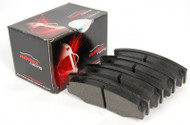Brake Pads Explained – We take a look at the challenges behind brake pad selection.
Posted by Mike @ Vagbremtechnic on 9th Feb 2017
At Vagbremtechnic we're consistently asked which brake pads we'd recommend for a specific setup, so much so that it's among the most commonly posed queries! We can't stress the importance of one-on-one customer communication when it comes to pad specification, hence why we recommend that buyers put aside 5 minutes of their time to talk to our engineering team. Forum chat most certainly has its uses and can be helpful, but there's no substitute for expert advice. With this in mind, we've put together the following feature in an attempt to debunk some of the myths about brake pads.
When combined with an appropriate disc/bell assembly, a well specified set of brake pads can provide incredible stopping performance, and one of the biggest compliments we can receive is the news that our customers are considering tyre and suspension upgrades off the back of their brake purchase. A poorly specified pad combination will exhibit correspondingly poor thermal properties, leading to degraded brake performance, and friction material from the pad then being transferred through to the disc. This all too often manifests itself in a 'pulsing sensation,' one that's all too easy to confuse with warped discs.
The above is, we feel, an area that needs addressing. We have supplied over 400 kits of our signature 362mm uprated disc packages for the Audi TTRS, the model which gave birth to VBT some years ago, and one which we therefore know a great deal about. We do very occasionally receive feedback from customers complaining of 'warped' discs, and while we don't wish to sound dismissive, the clear majority of these instances can be put down to incorrect pad specification for the application in question. Indeed, VBT disc and bell assemblies are designed to operate to extreme temperatures and in some of the harshest conditions imaginable, with bell design features that promote balanced temperatures on both sides of the rotor. It's not unknown for these discs to complete 24 hour races in 40 degree ambient temperatures, all without fault and while looking good as new when the flag falls.
So, which pad should you opt for?
Firstly, it goes without saying that any pad fitted to a road going vehicle should be Reg 90 approved. This is basically a CE mark which confirms that both the pad's compound and shape have been tested, and that it falls within a defined margin in terms of performance in relation to the pad that was originally OE-fitted to the car 'as new.' It should also be noted that some aftermarket pads may well have approval, but that said approval may also have been sought in other markets, namely China / Taiwan / Japan and other areas of the far East.
This situation leaves us in a bit of a predicament: a bone stock, 2006 Mk5 GTI making 200BHP is a wholly different proposition to a fettled Stage 2+ Mk5 GTI, although the law only allows us to fit “equivalent” Reg 90 pads for the 200BHP car. It's all part of the rich tapestry of modding your VW, and at the end of the day it falls to you to make the correct call. You’ll find many aftermarket pads are available for your car that exceed the capability of the OEM pad, that, unfortunately for us, haven’t been put through the Reg 90 process. It costs approximately £10,000 per pad shape per compound to get approved, a huge amount of money for all but the largest of brake manufacturers. It is however significantly cheaper to put a dayglo sticker on the side of the box saying “TRACK USE ONLY – DO NOT UNDER ANY CIRCUMSTANCES USE ON A PUBLIC HIGHWAY”
As mentioned, Vagbremtechnic can’t sell you race pads for the road, we have to ask you to obey the rules and then assume you’ll heed the warnings on the box. We like to think that our experience and expertise plays a part in your decision, and that it will enable you to bring your Stage 2+ GTI to a halt in a calm and controlled manner when and if required.
With the above in mind, let's focus on specific braking situations and the impact they can have on the manner in which your car pulls up. It goes without saying that there's no way you can tell whether the heavy braking manoeuvre you're presently pulling is to make a downhill exit on the M1, or whether you're hammering around Brands Hatch on the way to Paddock Hill Bend. All it knows is system pressure, and whether the front wheels are in imminent danger of locking up (a function of suspension, tyre friction and vehicle weight) - it has no idea of the environment it's actually operating in.
The above serves to underline the issues associated with brake pad choice, compound and use, and all 3 are hugely important to the performance of your car and, far more significantly, your continued health and wellbeing.
Making a suitably capable brake setup isn't actually so difficult, not if you have access to the kinds of materials and expertise that VBT can call upon. Far harder is what mass market car manufacturers must achieve: constructing a road car that meets the approval of the performance car cognoscenti, while also meeting the myriad emissions and safety requirements all modern vehicles must adhere to. The good news is that this leaves plenty of scope for aftermarket tuning specialists like APR to go to work, to make them properly quick – to a degree that simply wouldn't have been possible a handful of years ago. We'll use the Stage 1 Audi TTRS as a good example of this in action, a relatively lightly fettled car, true, but one that's able to pump out approximately 410bhp with little more than some APR software and a de-cat pipe. To put that in some kind of perspective, it's enough to keep pace with high end exotica from the tail end of the '80s, the F40 being a good example. It says an awful lot that this is all do-able in a £30k coupe with a full interior, air con, sat-nav and a spare wheel, and at a price point that doesn't mean you have to plan a Brink's-Mat style bullion heist beforehand!
Brake performance hasn't always kept pace with raw horsepower though, and the bare stats prove it. Consider that the F40 made do with Brembo 4 pots with 40/44mm pistons on a 330mm disc, a setup which simply wouldn't be deemed capable enough for fitment to a modern supercar. The TTRS we've been using as a modern benchmark? Well, the VBT kit boasts 40/44mm pistons and 362mm discs, with scope for even larger hardware should the buyer wish. In braking terms at least, we've never had it so good.
The most important point to take away from this, is not buy a box of brakes on the assumption that the pads which come bundled within it will be suited to your car and the manner in which you drive it. VBT never bundle pads with our disc and caliper kits for this very reason, we're only too aware of the significant role they play in the overall performance of any given brake setup, and we'd far rather our customers took the time to discuss their specific arrangements with us beforehand. We'll come up with a solution that won’t see you having brake fade on the track day you just invested £250 in, while at the same time won't force you to tackle the morning commute on a pair track pads poorly suited to the task at hand, potentially putting both you and your car in danger.
We stock all popular compounds for your modified VAG car, including well regarded offerings from the likes of Mintex (M11 Series) and the Pagid RS series, both on the shelf and ready to ship at a moment's notice. We also stock the fabled, near legendary Project MU Racing range, the last word in brake pad tech. Our pad range starts at £30 and goes right up to £980 plus VAT, though we wouldn't recommend these, not unless you own a Lamborghini Gallardo and plan to use the Endurance compound for some gruelling, round the clock racing! Whatever you happen to drive and no matter how you plan on driving it, it's safe to say we’ll have something for you in stock and ready to send out.
VAGBREMTECHNIC LTD
Unit 1 Siemens Road, Irlam,
M44 5AH , United Kingdom.
Email: sales@vagbremtechnic.com
+44 (161)-804-9888
Monday to Friday: 9am - 5pm


